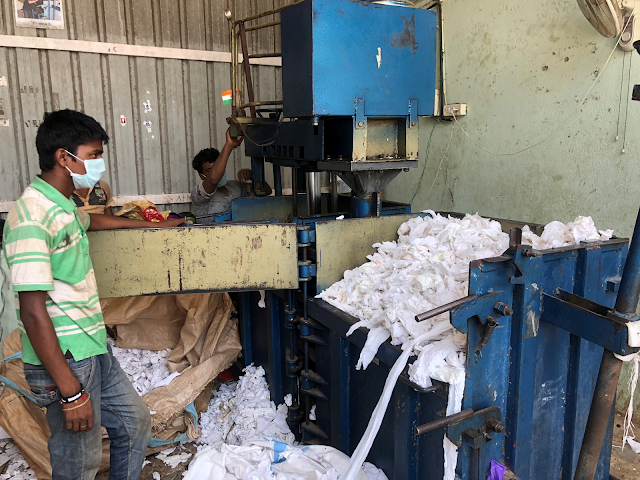Our day was slated to start off bright and early; however, damaging winds and heavy rainfall from an overnight thunderstorm slowed us down. After a slight a delay, our three-car caravan arrived and escorted us from the UTC campus across Bangalore to meet up with Hasiru Dala staff.
After we arrived, one of our hosts, Jayanthi from Hasiru Dala led us through a neighborhood where Hasiru Dala manages the waste and explained to us the importance of their segregated waste system (dry, wet, and sanitary wastes). To better understand how this segregated waste system works for the waste collectors, we followed a garbage collector for a few short stops through an upper-class neighborhood. Reflecting on our short walk through the neighborhood, I couldn’t help but to notice some of the differences between our waste collection processes in the US and how it is done here in India, such as the lack of use of garbage bags.
Along the garbage collector route there were several large green bins located along the base of some of the households. Jiyanthi explained that these bins were used for compost. To give our group a better understanding on how and why we should compost our food wastes, Jiyanthi led us to a “first of its kind” community and home composting learning center. It was here at the composting outreach center that we learned about the various types of composting units (aerobic and anaerobic) which could be applied anywhere from small single-family residences to large multi-family apartment complexes.
Additionally, Jiyanthi spoke briefly on the environmental and biological conditions required to efficiently produce a rich compost material (proper C:N ratio, moisture content, presence of microbes, etc) without the undesirable, smelly side effects of a poorly functioning composting unit (which unfortunately is the common public misperception of composting units).
Following our tour through the composting park, we sat down for a much needed breakfast which included idly, masala dosa, and some fresh fruit juice. During our lunch I thought of how composting in Minnesota has been (in my eyes) an up-and-coming area of interest for many Minnesotans. However, I could not think of an educational facility such as the one we had just visited which could educate us on how to properly compost.
After our breakfast, we loaded up into the cars to visit the dry waste recycling facility operated by Hasiru Dala which was located near the outskirts of Bangalore. Upon our arrival, we were met by the operations manager Maregowda whom along with Indha gave us some background information on the facility itself. We learned that this facility receives waste from approximately 110 different companies and currently sorts the dry waste into 15 different categories.
After a brief introduction to the recycling facility given by Indha and Maregowda, we ventured over to the conveyer shed where we observed several women hand-sorting waste into four separate bins at their sides (household waste, food waste, personal, and other). Even thought this was a “dry waste” facility, the incoming waste streams are often contaminated with some food waste which is utilized in an on-site composting bin.
Venturing through the rest of the facility we observed the dry waste being segregated further into more uniform waste streams such as white paper, brown paper, carry bags, and various different types of plastics. One image which stuck with me was the shear amount of tissue paper which was being hand sorted by a group of young men. I noticed another worker come up to them and offer them to some personal protective equipment on while our group was near them, most likely to give us the impression that they are working safely.
Most of the young men laughed at the thought of putting on the rubber gloves, as they would most definitely be bothersome to work in. Another young man took the gloves, only to put them down by his side while he continued to sort tissue paper. This made me reflect on the poor and relatively harsh working conditions in which these waste handlers have to work in. Additionally, I also thought on how hard it must be to balance personal protection and worker comfort. Later in the day we concluded our tour with lunch and by hearing Shekar speak on the challenges of operating Hasiru Dala and how their business model could work in the United States.
-- Mike R.



